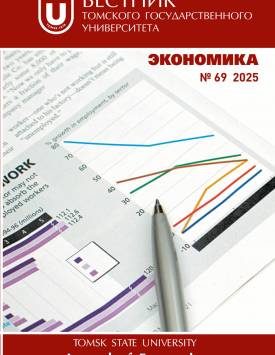Technological sovereignty and structural adaptation of the economy with the support of the Industrial Development Fund
The article examines the role of the Industrial Development Fund (IDF) in ensuring Russia's technological sovereignty in the face of unprecedented sanctions pressure. The relevance of the research is due to the need for a scientific understanding of the mechanisms of structural adaptation of the economy and the search for effective tools to support industry in conditions of disruption of production and technological chains and limited access to advanced technologies. The current geopolitical situation dictates the need for a comprehensive reorganization of economic mechanisms, including the modernization of production chains, the diversification of partnerships and the formation of an independent technological base. In these circumstances, an analysis of the activities of the Industrial Development Fund as an institution of state support opens up opportunities for identifying effective methods of activating technological potential and economic restructuring. Additional importance is attached to the study by the need for a theoretical rethinking of the strategic foundations of industrial policy in the face of external pressure, which includes both an assessment of the effectiveness of current supportive initiatives and the development of proposals to optimize the existing tools of state support for the industrial sector. The methodological basis of the study is a comprehensive analysis of the activities of the IDF using a systematic approach, comparative analysis and methods of statistical data processing. The information base was the official data of the IDF, including statistics on the cost structure and conditions of financing programs, as well as scientific publications by domestic researchers. The work analyzes the research of authors from the Institute of Economics of the Russian Academy of Sciences and others. As a result of the research, the author's definition of technological sovereignty is proposed as the ability of the state to ensure sustainable economic development based on its own technological competencies while maintaining selective integration into global chains. The structure of the IDF financing programs is analyzed; the key principles of the Fund's work are identified, including concentration on projects of strategic importance and ensuring the repayment of funds. As part of the scientific discussion, the inconsistency of the position on the priority role of venture capital in achieving technological sovereignty is substantiated. The advantages of the IDF as a key tool for technological development are proved, including the possibility of long-term concessional financing, a systematic approach and coordination with state industrial policy. It is concluded that the IDF is an effective institution for ensuring Russia's technological sovereignty due to the unique opportunities to support strategically important projects, proven mechanisms of expertise and monitoring, as well as the ability to provide a synergistic effect from the interaction of various instruments of state support for industry. The author declares no conflicts of interests.
Keywords
TECHNOLOGICAL SOVEREIGNTY, INDUSTRIAL DEVELOPMENT FUND, STRUCTURAL ADAPTATION OF ECONOMY, SANCTIONS PRESSURE, INDUSTRIAL POLICYAuthors
| Name | Organization | |
| Stepanov Nikita S. | Institute of Economics of the Russian Academy of Sciences | stepanov720@inecon.ru |
References

Technological sovereignty and structural adaptation of the economy with the support of the Industrial Development Fund | Vestnik Tomskogo gosudarstvennogo universiteta. Ekonomika – Tomsk State University Journal of Economics. 2025. № 69. DOI: 10.17223/19988648/69/1
